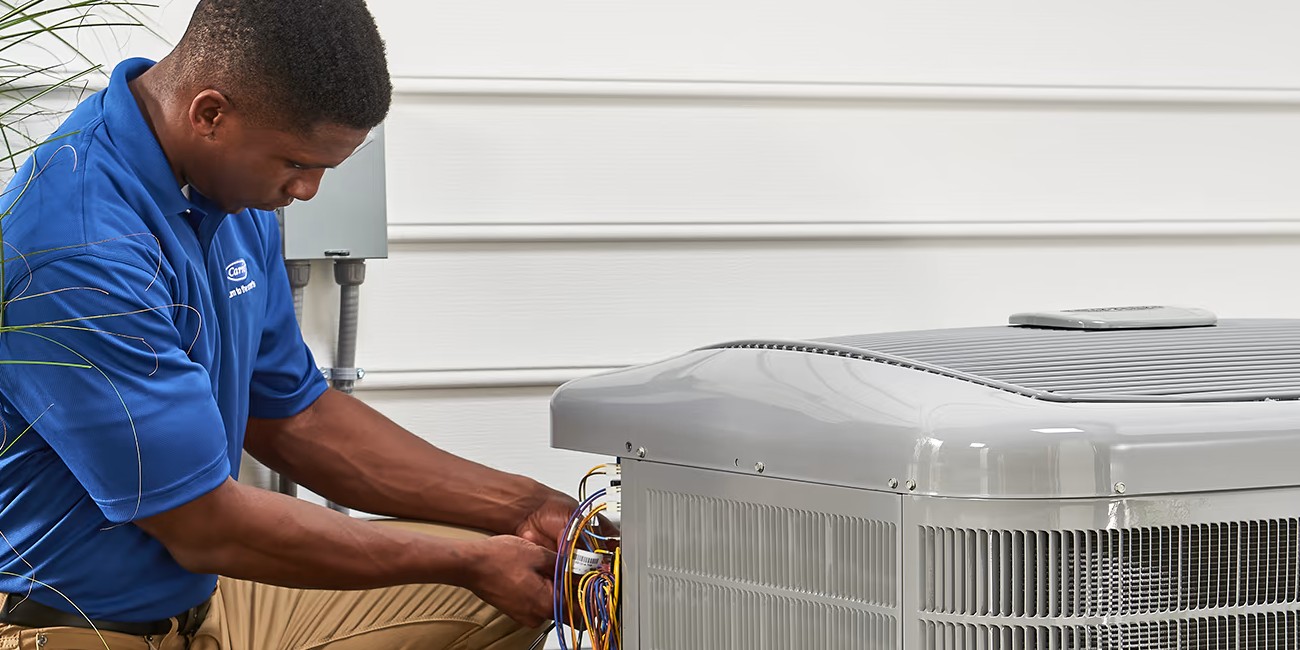
Electrek spoke with Heidi Gehring, associate director, cooling product marketing at Carrier HVAC, about the five essential things to know about this energy-efficient, cost-effective way to heat and cool a home.
Electrek: What’s a heat pump and how does it work?
Heidi Gehring: A heat pump is often mistaken for an air conditioner at first glance. What makes it different from an air conditioner is that it can both heat and cool your home using electricity and refrigerant.
In cooler months, heat is pulled from the outdoor air and transferred indoors; in warmer months, the system pulls heat out of the indoor air. Heat pumps have both an indoor and outdoor component. Each unit contains a fan and coil that operates either as a condenser (in cooling mode) or an evaporator (in heating mode). The fan moves the air across the coil and throughout the ducts in the home.
Electrek: Do heat pumps save you money, and what kinds of cost savings can be expected?
Heidi Gehring: Because heat pumps are more energy efficient, they can save you money on your heating and cooling bills. Your savings will vary based on the model you select.
Heat pumps are rated by their Heating Seasonal Performance Factor (HSPF2) – which is a measure of a heat pump’s overall energy efficiency during the heating season – their Seasonal Energy Efficiency Ratio (SEER2), and their Energy Efficiency Ratio (EER2). The higher the rating, the more energy-efficient the system.
Additionally, the US government’s Inflation Reduction Act of 2022 includes incentives for the installation of high-efficiency home heating and cooling products, including up to a $2,000 tax credit for high-efficiency heat pumps and up to 30% for geothermal heat pump systems placed in service between 2022 and 2032. Look into local and state programs, too, as many utilities and local governments offer heat pump rebates.
Electrek: Why is a heat pump better for the environment?
Heidi Gehring: Heat pumps rely on electricity rather than fossil fuels, making them a much greener choice. Improvements in technology in recent years also mean that heat pumps are more efficient than ever, requiring less electricity than older heaters, furnaces, and air conditioners.
Geothermal heat pumps are also available – they pull energy directly from the earth to heat or cool your home and can result in up to 70% savings on your energy bill.
Electrek: What features should you consider when comparing different models?
Heidi Gehring: Heat pumps vary in the number of stages or speeds they offer. Different speeds or stages can affect your comfort and the consistency of indoor temperature. Humidity plays a major role but is often overlooked. Two-stage and variable-speed offer better control because they operate for a longer period of time at lower speeds and use less energy. These pull more humidity out of the air than models with a single-stage compressor.
Variable-speed and two-stage models are generally quieter than single-stage models, and because they run longer, that means the air is run through the filter more, so it has less chance of becoming stagnant.
Electrek: When is the best time of year to install a heat pump?
Heidi Gehring: Usually in the spring or fall. During the coldest winter months and hottest summer months, demand for systems and technicians increases, so you may experience longer wait times and higher prices. Make sure you hire a professional. HVAC systems of any kind require expert knowledge for installation and are not a good DIY project.
If you’re switching from a traditional HVAC system to a heat pump, you may also need electrical upgrades. A professional HVAC installer can help you with that as well.
Read more: This award-winning apartment heat pump can fit under a kitchen sink
Photo: Carrier HVAC
Top comment by tagno25
"A heat pump is often mistaken for an air conditioner at first glance" Obviously trying to sell more HVAC systems.
An air conditioner IS a heat pump, it just doesn't have a reversing valve. A traditional air conditioner only transfers heat from inside to outside, the reversing valve allows the system to transfer heat from the outside to the inside.
Heidi Gehring is the associate director, cooling product marketing at Carrier HVAC. She joined Bryant in 2017 as the quality manager for warranty, data analytics, and field service technology. In 2019, she moved into product marketing. She holds a bachelor’s degree in industrial and systems engineering from the University of Wisconsin Madison and an MBA from Purdue Global.
If you’re looking to replace your old HVAC equipment, it’s always a good idea to get quotes from a few installers. To make sure you’re finding a trusted, reliable HVAC installer near you that offers competitive pricing on heat pumps, check out EnergySage. EnergySage is a free service that makes it easy for you to get a heat pump. They have pre-vetted heat pump installers competing for your business, ensuring you get high quality solutions. Plus, it’s free to use!
Your personalized heat pump quotes are easy to compare online and you’ll get access to unbiased Energy Advisors to help you every step of the way. Get started here. – *ad.
UnderstandSolar is a free service that links you to top-rated solar installers in your region for personalized solar estimates. Tesla now offers price matching, so it’s important to shop for the best quotes. Click here to learn more and get your quotes. — *ad.
FTC: We use income earning auto affiliate links. More.





Comments